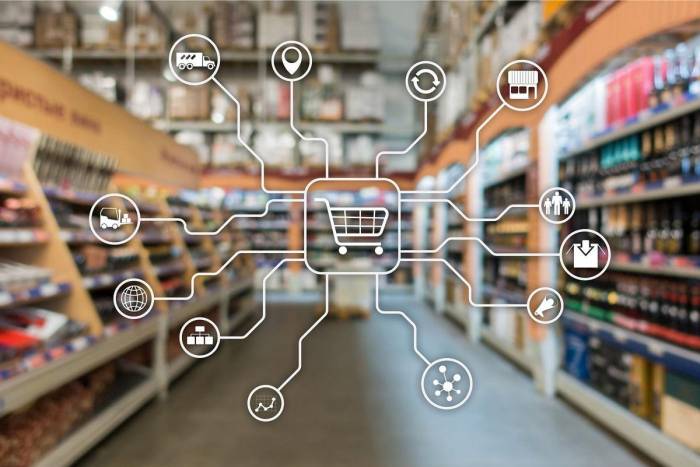The Future of Retail Marketing in a Digital World
As The Future of Retail Marketing in a Digital World takes center stage, this opening passage beckons readers with an engaging overview of the topic. The digital age has revolutionized traditional retail marketing, paving the way for innovative strategies and campaigns that captivate consumers in new ways.
Overview of Retail Marketing in a Digital World
Retail marketing in the digital age refers to the strategies and techniques used by retailers to promote their products and services through online channels. This includes social media, email marketing, search engine optimization (), and other digital platforms. The shift to digital technologies has revolutionized the way retailers interact with consumers, allowing for more personalized and targeted marketing efforts.Digital technologies have transformed traditional retail marketing strategies by providing retailers with valuable data insights into consumer behavior.
With tools like analytics and customer relationship management (CRM) systems, retailers can better understand their target audience and tailor their marketing campaigns accordingly. Additionally, the rise of e-commerce has enabled retailers to reach a global audience and offer a seamless shopping experience across various devices.Successful digital marketing campaigns in the retail sector include examples like Amazon's personalized recommendations based on previous purchases, Sephora's virtual try-on feature for cosmetics, and Nike's interactive mobile app for customized sneakers.
These campaigns leverage data-driven insights, user-friendly interfaces, and innovative technologies to enhance the overall shopping experience for consumers and drive sales for retailers.
Importance of Data Analytics in Retail Marketing
Data analytics plays a crucial role in shaping the future of retail marketing in a digital world. By harnessing the power of data, retailers can gain valuable insights into consumer behavior, preferences, and trends, allowing them to make more informed decisions and create personalized marketing strategies tailored to their target audience.
Understanding Consumer Behavior
Data analytics enables retailers to analyze vast amounts of data to understand how consumers interact with their brand, products, and marketing campaigns. By tracking online and offline consumer behaviors, retailers can identify patterns, preferences, and trends, helping them to anticipate customer needs and deliver more relevant and personalized experiences.
Personalizing Marketing Efforts
With data analytics, retailers can segment their customer base and create targeted marketing campaigns that resonate with specific customer segments. By leveraging data on past purchases, browsing history, and demographic information, retailers can personalize product recommendations, promotions, and messaging, leading to higher engagement, conversion rates, and customer satisfaction.
Benefits of Data-Driven Strategies
Incorporating data-driven strategies in retail marketing offers numerous benefits, including improved customer engagement, increased sales, and enhanced brand loyalty. By leveraging data analytics tools and technologies, retailers can optimize their marketing efforts, allocate resources more effectively, and stay ahead of the competition in a rapidly evolving digital landscape.
Omni-Channel Marketing Strategies
Omni-channel marketing is a strategy that integrates all available channels to provide a seamless shopping experience for customers. It allows retailers to interact with customers through various touchpoints, such as online, mobile, in-store, and social media, creating a consistent brand experience.
Creating a Seamless Shopping Experience
One way retailers can create a seamless shopping experience across multiple channels is by ensuring that all channels are interconnected and share customer data. This means that a customer can start their shopping journey on one channel, such as a mobile app, and seamlessly transition to another channel, like a physical store, without losing any information or progress.
- Implementing a unified customer database that collects and analyzes data from all touchpoints to provide personalized recommendations and promotions to customers.
- Utilizing technologies like RFID tags, beacons, and QR codes to bridge the gap between online and offline shopping experiences.
- Offering services like click-and-collect, where customers can purchase items online and pick them up in-store, blurring the lines between digital and physical retail.
Examples of Effective Omni-Channel Marketing
Many brands have successfully implemented omni-channel marketing strategies to enhance the customer experience and drive sales:
- Starbucks:Starbucks allows customers to order and pay for their drinks on the mobile app and pick them up in-store, making the ordering process more convenient and efficient.
- Disney:Disney's MagicBand wearable technology connects all aspects of the Disney experience, from theme park access to hotel room keys, creating a seamless and personalized experience for guests.
- Sephora:Sephora's mobile app integrates with in-store experiences, allowing customers to scan products, receive personalized recommendations, and access their purchase history both online and in-store.
Personalization and Customer Experience

Personalization plays a crucial role in enhancing the overall customer experience in retail marketing. By tailoring marketing messages and offers to individual customers based on their preferences and behavior, retailers can create a more engaging and relevant shopping experience.
Importance of Personalized Marketing
- Personalized marketing helps build stronger relationships with customers by showing them that their needs and preferences are understood and valued.
- It increases customer loyalty and retention by offering personalized recommendations and promotions that resonate with each individual.
- By delivering more relevant and targeted messages, personalized marketing can lead to higher conversion rates and increased sales.
Leveraging Customer Data for Personalization
- Retailers can leverage customer data collected through various touchpoints such as online interactions, purchase history, and social media activity to create personalized marketing campaigns.
- Utilizing data analytics tools, retailers can segment customers based on their demographics, behavior, and preferences to deliver personalized content and offers.
- By analyzing customer data in real-time, retailers can react quickly to changing consumer preferences and market trends, ensuring a seamless personalized shopping experience.
Future Trends of Personalization in Retail Marketing
- AI-driven personalization: Artificial intelligence and machine learning technologies will play a significant role in predicting customer behavior and delivering hyper-personalized shopping experiences.
- Hyper-localized marketing: Retailers will focus on delivering personalized content based on the customer's location, weather, or local events to create a more tailored experience.
- Personalized omnichannel experiences: The future of retail marketing will involve integrating personalized experiences across all touchpoints, including physical stores, websites, mobile apps, and social media platforms.
Emerging Technologies in Retail Marketing
In today's digital world, the retail marketing landscape is constantly evolving with the integration of cutting-edge technologies. Emerging technologies such as Artificial Intelligence (AI), Augmented Reality (AR), and Virtual Reality (VR) are revolutionizing the way retailers interact with customers and drive sales.
Impact of AI, AR, and VR on Retail Marketing
- AI-powered personalized recommendations: Retailers utilize AI algorithms to analyze customer data and provide personalized product recommendations, enhancing the shopping experience.
- AR and VR for immersive experiences: AR and VR technologies allow customers to visualize products in real-world settings or try virtual experiences before making a purchase, increasing engagement and reducing returns.
Chatbots and Voice Assistants in Retail
- Enhanced customer service: Chatbots and voice assistants enable retailers to offer 24/7 customer support, answer queries, and guide customers through the purchasing process, improving customer satisfaction.
- Personalized interactions: Through AI, chatbots can engage in personalized conversations with customers based on their preferences and purchase history, creating a more tailored shopping experience.
Innovative Technology Implementations in Retail Marketing
- Smart mirrors: Retailers are implementing smart mirrors equipped with AR technology that allow customers to virtually try on clothing and accessories, providing a unique and interactive shopping experience.
- IOT devices: Internet of Things (IoT) devices are being utilized in retail spaces to collect data on customer behavior, optimize inventory management, and enhance overall operational efficiency.
Final Review
Wrapping up our discussion on The Future of Retail Marketing in a Digital World, it is evident that the landscape of retail is evolving rapidly. By embracing data analytics, omni-channel strategies, personalization, and emerging technologies, retailers can stay ahead in the dynamic digital world and create lasting connections with customers.
Query Resolution
How has data analytics impacted retail marketing?
Data analytics allows retailers to gain valuable insights into consumer behavior, enabling personalized marketing efforts and enhancing overall strategies to meet customer needs effectively.
What is omni-channel marketing and why is it important?
Omni-channel marketing involves creating a seamless shopping experience across various channels, ensuring consistency and convenience for customers. It is crucial in today's retail industry to provide a cohesive brand experience.
Why is personalization essential in retail marketing?
Personalized marketing enhances customer experience by tailoring messages to individual preferences, creating a more engaging and relevant interaction that fosters loyalty and brand trust.
How are emerging technologies like AI and AR influencing retail marketing?
Technologies such as AI and AR are reshaping customer interactions, offering innovative ways to engage and connect with consumers through personalized experiences and virtual elements.




